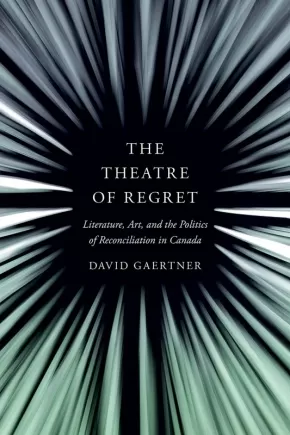David Gaertner
David Gaertner is an assistant professor in the Institute of Critical Indigenous Studies at the University of British Columbia. His articles have appeared in Canadian Literature, American Indian Cultural and Research Journal, and Bioethical Inquiry, among other publications. He is the editor of Sôhkêyihta: The Poetry of Sky Dancer Louise Bernice Halfe and co-editor, with Sophie McCall, Deanna Reder, and Gabrielle L’Hirondelle Hill, of Read, Listen, Tell: Indigenous Stories from Turtle Island.
Books (1)
Synopsis:
The Canadian public largely understands reconciliation as the harmonization of Indigenous–settler relations for the benefit of the nation. But is this really happening? Reconciliation politics, as developed in South America and South Africa, work counter to retributive justice. The Theatre of Regret asks whether – within the contexts of settler colonialism – the approach to reconciliation will ultimately favour the state over the needs and requirements of Indigenous peoples.
Interweaving literature, art, and other creative media throughout his analysis, David Gaertner questions the state-centred frameworks of reconciliation by exploring the critical roles that Indigenous and allied authors play in defining, challenging, and refusing settler regret. In 2007, Canada became the first liberal democracy to formally implement a Truth and Reconciliation Commission (TRC) process, a prominent element of global intrastate politics in the 1990s. Through close examination of core concepts in reconciliation theory – acknowledgment, apology, redress, and forgiveness – Gaertner unpacks reconciliation within the contexts of Canadian settler colonialism and the international history of the TRC. In so doing, he exposes the deeply embedded colonial ideologies that often define reconciliation in settler-colonial states.
The Theatre of Regret redirects current debates about reconciliation and provides a roadmap for the deconstruction of state-centred discourses of regret.
Reviews
"The Theatre of Regret makes a vital contribution to discussions about reconciliation in Canada by foregrounding the importance of Indigenous literatures for engaging, troubling, and, most crucially, speaking far beyond reconciliation’s limits. Gaertner listens deeply to how Indigenous artists speak truths that cannot be unheard and give resonant voice to world-altering ways of living in good relation." — Pauline Wakeham, coeditor of Reconciling Canada: Critical Perspectives on the Culture of Redress
Educator Information
Scholars and students of Indigenous studies, cultural studies, Canadian studies, literature, law, and political science will find this book challenging and necessary, as will thoughtful Canadian readers.
Table of Contents
Introduction: Bearing Witness to the TRC
1 The Theatre of Regret: The Politics of Reconciliation after the Second World War
2 Listen to the Bones: Colonial Static and the Call for Reconciliation
3 To Acknowledge, but Not to Accept: Critical Reflections on Settler State Apologies
4 Redress as a Gift: Historical Reparations and the Logic of the Gift
5 An Exercise in Forgiveness: Confronting the Risk of Forgiveness and Empathy
Conclusion: “Shallow Reconciliation” and the Indigenous Future Imaginary
Notes, Selected Bibliography, Index
Additional Information
320 pages | 6.00" x 9.00" | Paperback






